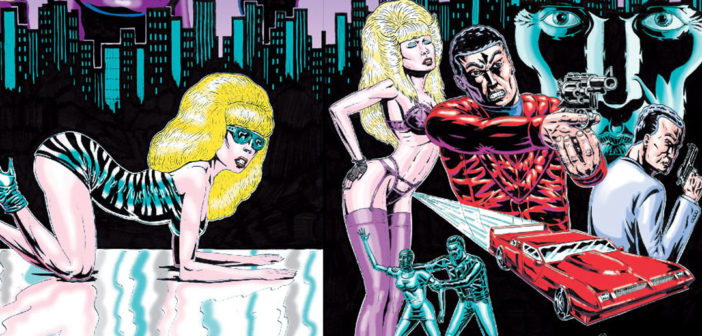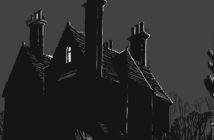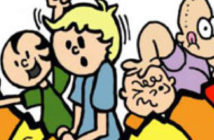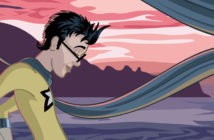The city is a dangerous place to live—at least Benjamin Marra’s city is. There are the worst sorts of predators lurking around in that place after dark: rape-hungry frat boys, syringe-wielding pimps, and mad slashers that take unsettling pleasure in carving up ladies of the night as if they were sultry jack-a-lanterns.
The first gal to meet such a grisly end is Jazzie, a woman whose bouffant of hair is so admirable that even Peg Bundy would offer kudos. She’s a stripper who uses her body like a deadly weapon; think of her as a coke-snorting, x-rated Aphrodite and the stage is her temple. Men can’t get enough of the performance she puts on, and their empty wallets are proof. It’s unfortunate that such a goddess incarnate falls to the knife of a killer. The murder is brutal: several stab wounds to the chest finished with a slash across the throat.
This is how Benjamin Marra’s comic book series, Night Business, opens. It’s cold, stark, harsh, and unfriendly—I couldn’t get enough of it. Upon initial consideration, this might not say a whole lot about my own personal character. It certainly does appear to revel in misogynistic murder and celebrate pornographic violence. But Marra is a much craftier fellow than to blandly pump out the comic equivalent of I Spit on Your Grave.
I’m going to say it now to get it out of the way: this comic book reminds me a whole lot of Frank Miller’s Sin City, and I love Frank Miller’s Sin City. Creators like Miller are often judged because people assume their motives. Something like this could easily happen to Marra. I wouldn’t be surprised if someone picked up this comic, read it, and curtly assumed that he hates women because a girlfriend walked out a few years back and left him for emotional dead. But don’t be so naive. I met Marra at NYCC 2010 earlier this month, and he couldn’t have been more affable. I was instantly charmed.
But don’t take my word for it. Here is how Marra describes his creator-owned Traditional Comics in its mission statement: “Traditional Comics is a comic book publishing company that publishes comic books with stories containing themes consistent with traditional American values such as power, individualism, a personal code of justice, justice, the right to carry a gun, the right to fight, imposing your will upon the world, revenge, lust, sexy, desire, drug use, prostitution, and gambling. Our stories have white-knuckled action, intense drama, and drip with sexiness.”
Well said.
The victimized girls of Night Business all work for the Blitz Glam Exotic Talent Agency; its run by two guys named Johnny and Steve. The latter is the typical slick business man, while the former is a rough-neck charmer who wears a leather jacket that I can’t even begin to describe. In traditional cowboy fashion, they’re both on the hunt for the killer who is cutting up the Blitz Glam girls. Steve is more of a talker, while Johnny says all he needs with his fists and gun. But he does what he has to if he’s going to protect the rest of his clients, including: Chastity, a stripper with the grace of a ballerina; Alexis, a bubble-headed pole dancer; and Krystal, the bombshell newcomer.
Like Basin “Sin” City, Marra’s own unnamed city exists somewhere out of time and space. It’s set the 1980s according to the interior cover of the first issue, but it’s a forgotten detail. How simple it is to become lost in the brutal grit of the story. Everyone talks like they were born and raised in the streets. Who knows—they probably were. When reflecting on all of the characters involved, there appear to only be bad guys and even badder guys. Our hero, Johnny, who sort of looks like Joe Pesci from Raging Bull, has the spirit of Dwight McCarthy. Don’t forget: Dwight always wanted to do the right thing, but trouble was never far behind. Thus is Johnny’s fate, too.
He’s not the only one to suffer. Whoever the slasher is, he doesn’t stop with Jazzie. Chastity is his next victim, but she survives. Oh, she’s scarred, make no mistake, but she survives and eventually transforms into a classic phoenix metaphor. There are plenty of stories involving women who begin their journeys as the hunted and eventually turn into the hunter. I need not list them all. But I especially like Chastity for this very arc. Her path is obvious, but no less exciting.
There has never been a book like Night Business more suited for black and white. Every panel is contained and angular. Every shot is direct and level. Just as the story draws inspiration from Sin City, Marra’s risqué cartooning is a worthy tribute to the work of underground masters like Robert Crumb, especially when considering his work in collaboration with Harvey Pekar on American Splendor. It’s refreshing to see a book so realized in its style. Marra isn’t interested in pleasing anyone. He only wants to tell the story he is compelled to tell.
Returning to the mission statement of Traditional Comics: I’m reminded of the Beat Generation. Writers like Jack Kerouac and William S. Burroughs told stories that apposed the milquetoast vision of white, suburban America in the 1950s. That same kind of spirit lives in Night Business. Sure it’s violent. Sure it’s sexist. Sure it’s brutish. Sure it’s sleazy. Sure it’s crass. But it’s also bold. It’s also daring. It’s also exciting. And I couldn’t recommend it more.
This comic book review originally appeared on Broken Frontier.




